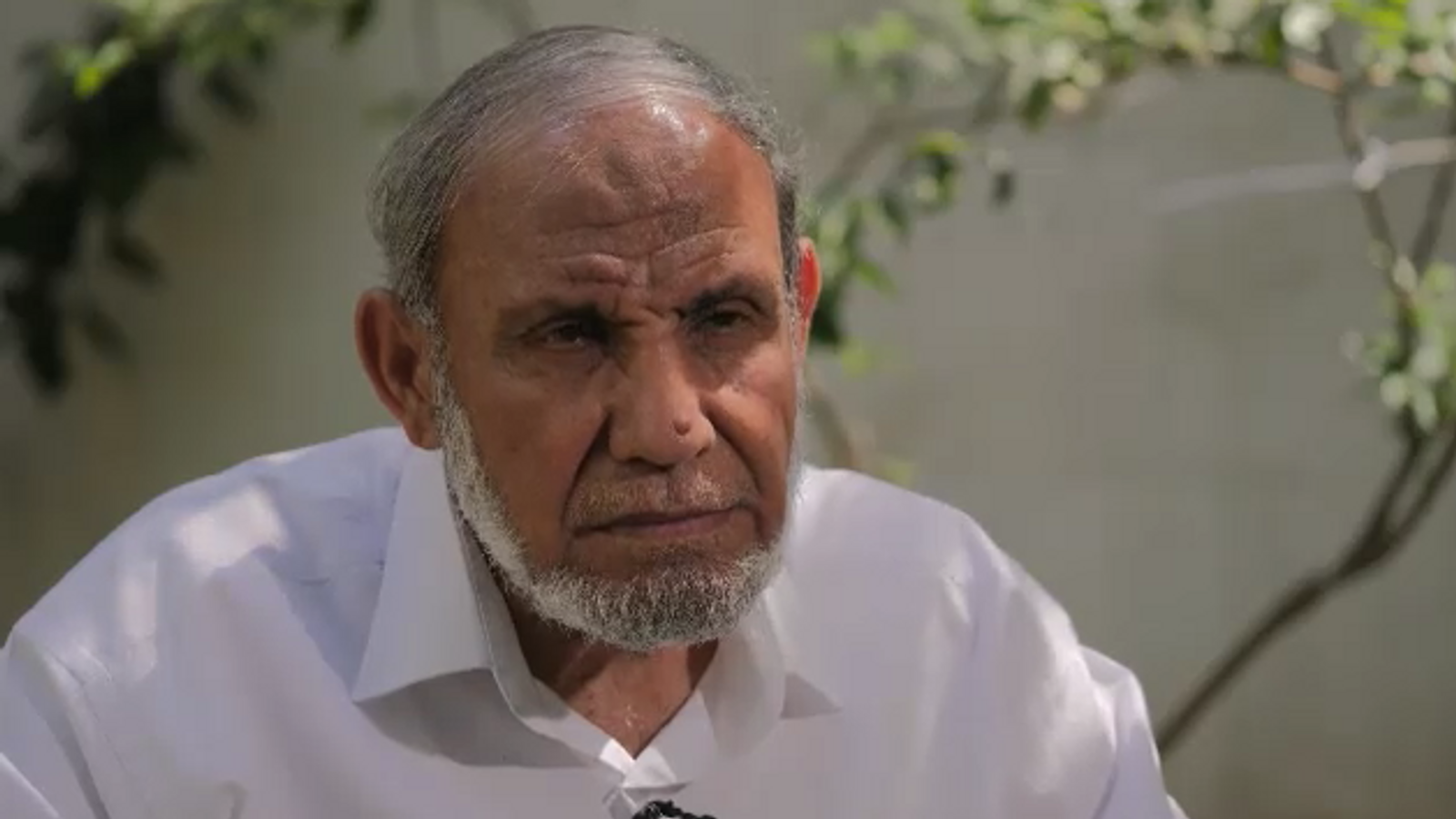A senior Hamas leader has told Sky News the group’s current ceasefire should hold but warned there was no chance of making peace with Israel for the moment.
In a wide ranging interview – the first he’s given to any broadcaster since the ceasefire was announced – Mahmoud Zahar, a Hamas co-founder, denied the group fires rockets from civilian areas and said he would be willing to talk to US President Joe Biden.
Asked if the ceasefire would hold, he said: “Yes, I think the most important point is the degree of impact on both sides.”
“Ceasefire up to this moment is acceptable from our side and from other side. For how long? I think nobody in both sides is looking for escalation more than what had been before. So I believe that it will continue.”
Eleven days of conflict between Israel and Hamas has left 260 dead – most in Gaza.
Yet Dr Zahar claims that Hamas achieved a strategic and symbolic victory.
“The new element here is the degree of the resistance movement, in particular in Gaza, to attack the Israeli targets and very important points, including most of the overcrowded area and this is the civilian, the civilian society. So for how long the Israeli will accept that?” He said.
The 76-year-old denied that Hamas fires rockets and missiles from within populated areas of Gaza despite multiple videos showing just that.
“No. No single rockets were sent from a civilian area. Most of the rockets from the border… no single civilian area. You give me give me example how we are going to bring rockets and to put it on the roof (of buildings).
Please use Chrome browser for a more accessible video player
Please use Chrome browser for a more accessible video player
“The area everybody knows the most of important area for self-defence was on the border.”
Pressed on why the organisation he represents is intentionally hitting civilian areas of Israel, he said they were targeting “the occupation not civilians”.
“This is not against Israeli communities, (it’s) against Israeli occupation. This is against Israeli aggression.”
Since its original charter in 1988, Hamas has shifted its rhetoric away from being a hard-line Islamist group which saw this conflict as a religious war against Jews.
In 2017 a revised charter essentially called for a two-state solution along the 1967 borders and it claimed that its conflict was no longer with Jews but with Zionism.
However Dr Zahar said the two-state process had been proved to be a failure because Israel doesn’t want it.
“Practically, practically, that was proved.” he said, arguing that the negotiations between Israel and the more moderate Fatah Palestinian faction in the West Bank had failed.
“It is not my assessment. Go and ask (Palestinian president) Mahmoud Abbas ‘are you now saying a two state solution is viable or not?’… He will say no… The Israelis are not going to accept a two-state solution.
“People went and they sat down on the table and signed an agreement and so on and failed. You are now asking me to practise a failed process?”
Subscribe to the Daily podcast on Apple Podcasts, Google Podcasts, Spotify, Spreaker
He refused to be drawn on hypotheticals over he would accept a two-state solution if a future Israeli government would do the same.
Asked if the State of Israel has the right to exist, he paused then said: “No. Why? Why? You are coming from America and you take my house, you came from Britain and you took my brother’s house, you took this. This is a settlement. This is a settlement.
“You are not a citizen. We are the owner of this area – Arabic area, well known. This is well known as Islamic area.”
Asked why Hamas was spending its money on missiles and rockets rather than on its people, he said: “Give me one example in the world that they have no military ministry to defend himself?
“We are here protecting ourselves against aggression, against the Israeli aggression. So if it is forbidden, this is a hypocrisy.”
Pressed once more on whether Hamas was prepared to share the land with Jews, he said: “We are not against Jews because Jews were living this area for long centuries. I’m speaking about occupation.”
He said Hamas would talk to American President Joe Biden.
“Why not? Why not? Mr Biden, yes he is supporting Israel but I think we have a mission as a Palestinian people to speak to him frankly.”
It will come as a relief for many that a senior Hamas officials believes this ceasefire will hold for now.
But, like so much in this conflict, the gulf between the two side remains vast.
As we left him, he showed me the damage to his neighbours house from Israeli airstrikes.
“One last question”, I asked. “How would you define peace?”
“Peace means justice. No peace without justice.” he said.
The prospects of long term peace elusive as ever.






















